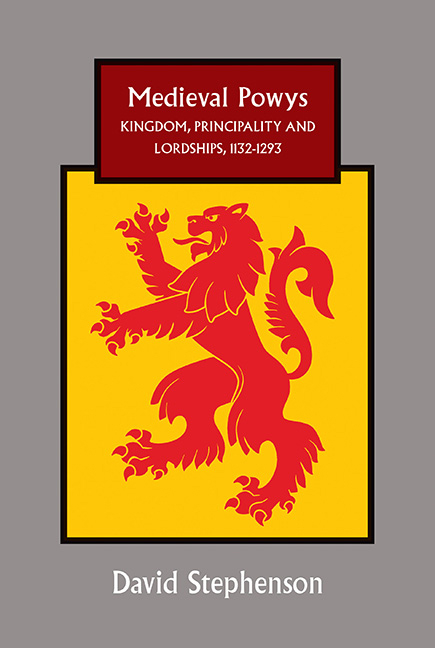Book contents
- Frontmatter
- Dedication
- Contents
- List of Illustrations
- Acknowledgements
- Abbreviations
- Map
- Miscellaneous Frontmatter
- Introduction: The problem of medieval Powys: historiography and sources
- Part I Powysian Polities in the Twelfth and Thirteenth Centuries: A Political Narrative
- 1 The re-emergence of Powys
- 2 The age of eminence: Madog ap Maredudd
- 3 Crisis and renewal: 1160 and its aftermath
- 4 The ascendancy and fall of Gwenwynwyn
- 5 Eclipse: the supremacy of Gwynedd
- 6 Survival: the case of Gruffudd, lord of Bromfield
- 7 Survival: the case of Gruffudd ap Gwenwynwyn
- 8 The persistence of Powysian lordship: Owain ap Gruffudd ap Gwenwynwyn and the descendants of Madog ap Maredudd
- Part II Characteristics of the Powysian Polities: Structures, Fault-Lines and Political Culture
- Appendices
- Select bibliography
- Index
- Miscellaneous Endmatter
6 - Survival: the case of Gruffudd, lord of Bromfield
from Part I - Powysian Polities in the Twelfth and Thirteenth Centuries: A Political Narrative
Published online by Cambridge University Press: 29 April 2017
- Frontmatter
- Dedication
- Contents
- List of Illustrations
- Acknowledgements
- Abbreviations
- Map
- Miscellaneous Frontmatter
- Introduction: The problem of medieval Powys: historiography and sources
- Part I Powysian Polities in the Twelfth and Thirteenth Centuries: A Political Narrative
- 1 The re-emergence of Powys
- 2 The age of eminence: Madog ap Maredudd
- 3 Crisis and renewal: 1160 and its aftermath
- 4 The ascendancy and fall of Gwenwynwyn
- 5 Eclipse: the supremacy of Gwynedd
- 6 Survival: the case of Gruffudd, lord of Bromfield
- 7 Survival: the case of Gruffudd ap Gwenwynwyn
- 8 The persistence of Powysian lordship: Owain ap Gruffudd ap Gwenwynwyn and the descendants of Madog ap Maredudd
- Part II Characteristics of the Powysian Polities: Structures, Fault-Lines and Political Culture
- Appendices
- Select bibliography
- Index
- Miscellaneous Endmatter
Summary
In the fifteen years that followed the death of Llywelyn ab Iorwerth in 1240 the government of Henry III emerged as the controlling force in Welsh affairs. That control was expressed partly in annexations of territory – eastern Gwynedd, for example, comprising the lands east of the Conwy, was brought under English royal administration. But annexation was accompanied by less direct mechanisms of control. In some regions Henry's government ensured that Welsh lordships were partitioned amongst those now deemed to be co-heirs, while favour was shown to, and responsibility assumed by, Welsh lords of proven loyalty to the English crown.
Aspects of both of these latter policies were applied in the lordship of northern Powys. There Madog ap Gruffudd was succeeded by his son Gruffudd, who emerged as the most powerful of several brothers. In 1236, at the outset of his lordship, Gruffudd had issued a charter to Valle Crucis in which he confirmed all of his father's grants to that abbey, and grants by men whom he described, unusually and very significantly, as Madog's co-heirs, Owain Brogyntyn and his sons and the sons of Owain Fychan. It is possible that this implies that Gruffudd was claiming primacy not only amongst the sons of Madog but also over those other branches of the ruling house that traced their descent from Madog ap Maredudd. But Gruffudd's ambitions must have been threatened by the assertions of supremacy in Powys by Llywelyn ab Iorwerth and his son Dafydd in 1238, and it is thus unsurprising to find him and two of his brothers, Hywel and Maredudd, making prompt declarations of allegiance to Henry III after Llywelyn's death in 1240. Nor is it surprising that Gruffudd and the same two brothers were amongst those who agreed in August 1241 to act as a pledge for Senana, wife of Gruffudd ap Llywelyn of Gwynedd, in her attempts to prevail upon Henry III to secure the release of her husband from his captivity by Dafydd ap Llywelyn. If Gruffudd ap Llywelyn had been freed, and if Henry had imposed a partition of Gwynedd between him and Dafydd, then the security of northern Powys from attack by Gwynedd would have been greatly improved.
- Type
- Chapter
- Information
- Medieval PowysKingdom, Principality and Lordships, 1132-1293, pp. 115 - 132Publisher: Boydell & BrewerPrint publication year: 2016



